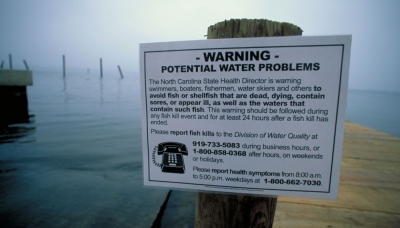Trump agency attorneys signal attack on mercury rule
The Trump administration on Tuesday asked to delay a court hearing on the already-implemented federal Mercury and Air Toxics Standards, a signal that the administration’s Environmental Protection Agency will soon have marching orders to weaken the public health protection.
The standards, sometimes called “MATS,” are the first federal rules to reduce the amount of mercury and other toxics sent into the air from power plants. Over decades, that mercury settled into water where it contaminated fish.
Health departments in SELC’s six-state area have listed waters impaired with mercury and other toxics, along with advisories for consumption of fish from those waters.
Warning
Thousands of water bodies across the nation have mercury advisories warning people, especially pregnant women, to limit the amount of fish they eat, or to avoid fish entirely.
Adding more toxic mercury to our environment is a perverse attack on the health of American families,” said Frank Rambo, SELC’s Clean Air and Energy Program team leader. “There is no doubt that mercury harms human health and causes developmental disabilities for young children, and there is no doubt where the mercury comes from: coal. The only ones who want to undo progress on toxic mercury are coal lobbyists, and so far they control the Trump EPA agenda.
This a case SELC has litigated on behalf of health organizations including the American Lung Association, the American Public Health Association, and Physicians for Social Responsibility. Scott Pruitt, the Environmental Protection Agency administrator, previously challenged this case as Oklahoma Attorney General. He lost, twice.
But in his role overseeing the Environmental Protection Agency, Pruitt is moving to use his administrative authority to attack a rule when he could not get a court to agree with him.
The irony is these mercury standards are already in place and most of the top power companies are already meeting them to clean the environment,” Rambo said. “But now the fox is in the henhouse and trying to turn back the clock. Going backwards now makes no sense, and would inflict a heavy health and economic toll on the rest of us, especially here in the South.
Mercury contamination plagues the South, perhaps more than any other region of the country, because of the region’s heavy presence of coal-fired power plants. The Southeast’s abundant wetlands and slow-moving rivers are particularly susceptible to mercury contamination. In these coastal waters, mercury converts to its most toxic form and is more likely to accumulate in higher concentrations in fish.
There are thousands of large and small water bodies from Virginia to Alabama laced with mercury. In many Southern waters, entire species of fish either can’t be eaten at all, or must be eaten only occasionally.
- In Virginia, for example, all of the Blackwater River is contaminated with mercury.
- In Tennessee, the health department says of some lakes, “Fish should not be eaten. Also, avoid contact with water,” because of mercury.
- In South Carolina, nearly all coastal lakes and rivers are polluted with mercury.
- In North Carolina, Lake Gaston is one of many reservoirs and lakes contaminated with mercury.
- In Georgia, fish from large swaths of the Chattahoochee River are tainted with mercury.
- In Alabama, parts of the Mobile River produce fish dangerous to eat.
The EPA estimated last year that the standards will save $90 billion annually in public health costs. And an SELC analysis of EPA emission data shows that mercury pollution in the Southeast has plummeted 50 percent since the rule was finalized.
At the same time—and contrary to the dire predictions of MATS challengers like Pruitt—compliance with the standards has not caused the cost of electricity to skyrocket. In fact, after adjusting for inflation, the average homeowner in the Southeast paid $3 less per month in 2015 than in 2011, the last full year before MATS went into effect.
Pruitt says he favors both economic development and environmental protection, but his actions tell a different story,” Rambo said. “And so far, all he’s done is follow the orders of coal and oil lobbyists and attack every American health protection he can get his hands on.
LEGAL CHALLENGE
The Trump administration is seeking a continuance, or a delay, in a case involving the Mercury and Air Toxics Standards. Requesting a delay has been a common administration tactic preceding efforts to abandon rules, gut them, or weaken them.
These standards were put in place in 2011. Pruitt, now the Environmental Protection Agency administrator, joined the coal industry and power companies then as the Oklahoma Attorney General in an effort to scrap the rule and its public health protections. He lost in the U.S. Court of Appeals in Washington and then in the U.S. Supreme Court on that front.
The Supreme Court refused to stay the rules as industry groups again tried to block them. The standards are in effect now and many power plants have already put into place technology to meet the limits.
If the Trump administration abandons the rule, it’s possible that companies already in compliance could disengage their mercury-reducing technology.
The only issue before the court centers on whether the Environmental Protection Agency’s robust consideration of costs satisfies the Clean Air Act’s requirements. The EPA and several health organizations maintain the health and financial benefits to the population from cutting mercury emissions is enormous, and outweighs any industry cost concerns.
